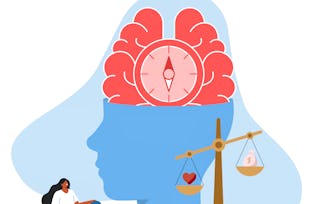This course examines how ethical decision-making unfolds at the intersection of law and psychology. Drawing on real-life legal casesand a host of classic psychological experiments, we explore how cognitive biases such as loss aversion, status quo bias, and framing effects can complicate even the most straightforward moral choices. You’ll explore how our natural tendency to focus on what is most salient in any given situation can skew risk assessments, and how motivated reasoning and self-serving biases may subtly warp our judgments, whether in the boardroom, the courtroom, or everyday life. Finally, we round out our investigation with practical tools—like decision matrices—that empower you to break down complex decisions into their component parts, ensuring that your choices not only reflect your core values but also withstand rigorous, objective scrutiny.
即将结束: 只需 199 美元(原价 399 美元)即可通过 Coursera Plus 学习新技能。立即节省

您将获得的技能
要了解的详细信息

添加到您的领英档案
1 项作业
了解顶级公司的员工如何掌握热门技能

该课程共有4个模块
In this module, students will learn the foundational concepts at the intersection of ethical decision-making and psychology. Through analysis of real-life legal cases and controlled experiments, learners will discover how cognitive biases and framing effects—such as loss aversion, status quo bias, and the endowment effect—influence moral reasoning and judgment. The lectures unpack the complexities of ethical dilemmas by examining how contextual factors, numerical framing, and underlying psychological mechanisms shape our decisions in both personal and professional settings. By engaging with classic studies like the dictator game, the bully game, and landmark legal cases, students will gain a nuanced understanding of how ethical and moral choices are systematically influenced by human psychology.
涵盖的内容
9个视频3个讨论话题
In Module 2, we introduce the role of salience and cognitive biases in ethical decision-making. We will examine how our attention is involuntarily drawn to specific stimuli, ranging from sensory cutes to vivid memories, and how this selective focus shapes our judgments. We will explore concepts such as the availability heuristic, hindsight bias, and anchoring effects, as well as how motivated reasoning and confirmation bias can distort our evaluation of risks and moral choices. By analyzing classic developmental tests like the Sally-Anne task alongside real-world examples in legal, financial, and everyday contexts, learners will gain insight into how salience influences what we notice, remember, and ultimately decide.
涵盖的内容
9个视频3个讨论话题
Module 3 focuses on the pervasive influence of motivated reasoning and self-serving biases in ethical decision-making. We will examine how preexisting beliefs shape the intake of new evidence and how individuals tend to favor information that confirms their desired conclusions. Through a series of experiments and real-world examples, learners will explore phenomena such as the self-serving bias, confirmation bias, and the just world hypothesis. The module culminates with practical strategies, such as “consider the opposite” and accountability interventions, that help mitigate these biases and promote more objective, value-aligned decision-making.
涵盖的内容
5个视频3个讨论话题
Module 4 introduces the decision matrix as a systematic tool for multi-attribute decision making. By breaking down complex, holistic judgments into discrete, measurable components, this module demonstrates how to disaggregate factors such as teamwork, sales performance, reliability, and leadership potential in managerial and hiring contexts. Students will learn how to assign appropriate weights to different attributes, aggregate granular judgments mechanically, and reduce the influence of salience and bias. Ultimately, the module equips learners with strategies to align decisions more closely with their organizational values and ethical priorities.
涵盖的内容
3个视频1个作业1个讨论话题
位教师

从 Leadership and Management 浏览更多内容
 状态:免费试用
状态:免费试用American Psychological Association
 状态:预览
状态:预览University of Pennsylvania
 状态:预览
状态:预览University of Lausanne
 状态:预览
状态:预览Fundação Instituto de Administração
人们为什么选择 Coursera 来帮助自己实现职业发展




常见问题
To access the course materials, assignments and to earn a Certificate, you will need to purchase the Certificate experience when you enroll in a course. You can try a Free Trial instead, or apply for Financial Aid. The course may offer 'Full Course, No Certificate' instead. This option lets you see all course materials, submit required assessments, and get a final grade. This also means that you will not be able to purchase a Certificate experience.
When you purchase a Certificate you get access to all course materials, including graded assignments. Upon completing the course, your electronic Certificate will be added to your Accomplishments page - from there, you can print your Certificate or add it to your LinkedIn profile.
Yes. In select learning programs, you can apply for financial aid or a scholarship if you can’t afford the enrollment fee. If fin aid or scholarship is available for your learning program selection, you’ll find a link to apply on the description page.
更多问题
提供助学金,






